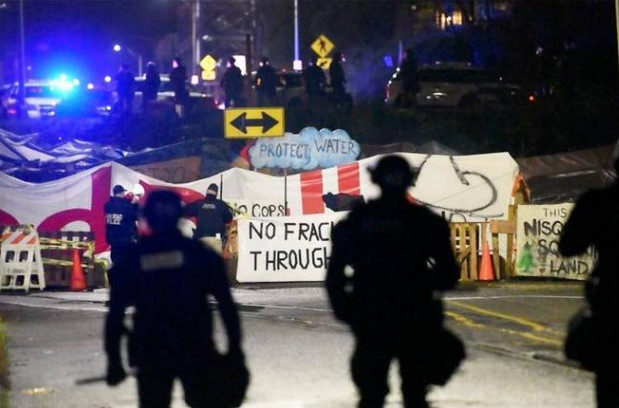Another Loss for Anti-Fracking Activists in Olympia, Wash.
For the second straight year, a group's blockade of railroad tracks to disrupt shipment of "fracking sand" to oil fields in North Dakota was broken up by police. Authorities prepare to clear anti-fracking protesters blocking tracks in Olympia, Wash., last week. (Steve Bloom)
Authorities prepare to clear anti-fracking protesters blocking tracks in Olympia, Wash., last week. (Steve Bloom)
For the second year in a row, anti-fracking activists in Olympia, Wash., gathered to protest the Port of Olympia’s shipping of ceramic proppants—otherwise known as fracking sand, used in the controversial extraction process—to oil fields in North Dakota. After having faced off with dozens of police in a predawn raid at their camp last year, the group, which had grown in diversity, nervously awaited a similar incident after gathering on Nov. 17.
Sure enough, last Wednesday, police blocked streets in the area of Seventh Avenue and Jefferson Street where the activists had set up a blockade, issuing verbal warnings before entering the camp. The Olympian reports that a police official said the camp was empty when officers moved in, but that as public works crews began clearing the camp, 20 to 30 protesters tried to approach and were pushed back by police.
The Washington Post adds context to the protest:
This was contested turf. Two sets of train tracks snaked north from the intersection to where the Port of Olympia sits on a piece of land jutting into the Budd Inlet like a fat thumb pointing from a fist. The encampment covered both rails, planting the makeshift site — and the people inside — directly in the path of any engines heading in or out of the port.
That was the point. In a peaceful protest spearheaded by members of local indigenous tribes, activists planned to disrupt rail shipments related to the hydraulic fracturing business in North Dakota. A similar effort a year before ended in arrests and flash bangs and burning recycling bins. This year, the activists were sure authorities would react similarly.
“We assumed another raid would be coming instantly,” one anonymous participant told the Post, referring to the police raid on a similar camp set up in November 2016. “We thought it had to come down. We were feeling nervous. People stayed up all night.”
According to a blogger specializing in Olympia news, the group is collectively known as Olympia Stand. It is demanding that the Port of Olympia cease all fossil fuel and military infrastructure shipments, as well as demanding “horizontal and democratic control of the Port of Olympia, including participation from area indigenous tribes,” according to a press release.
The release states, “Olympia Stand and other participants believe climate change can be stopped by engaging in non-violent direct action and civil disobedience against fossil fuel infrastructure, from train blockades and Port shutdowns to occupations of pipeline construction sites. Policymakers can continue to take no action on this issue, and doom future generations to an uninhabitable planet, or they can follow the lead of people around the world fighting for a Just Transition away from fossil fuels and extractive economies. Meanwhile, we will continue to fight, whether they like it or not.”
Kyle Taylor Lucas, an indigenous rights activist involved in the protest, told The Washington Post that this year’s protest felt different from last year and included many young protesters of varying political ideologies—but that the rights of the indigenous are a shared value.
“I should note how uplifting it was for we indigenous women to hear all the young ones make strong and unequivocal statements in solidarity with us,” she said.
Last year, Lucas and other activists set up a camp in the same location to protest the Dakota Access pipeline. A week into their stakeout, port officials arranged a meeting with the activists. But 12 hours before it was scheduled to occur, police raided the camp to allow a train to pass through and arrested 12 protesters. Olympia Police Chief Ronnie Roberts publicly rebuked the port officials for failing to come to terms with the activists and even called on the port to stop shipping proppants altogether.
“I don’t want my department to be the scapegoat for the decisions the port is making,” he said to the City Council, The Olympian reported. “I have spent the last five years empowering our department to build trust and build relationship with our community. I don’t want to lose those efforts. It angers me to have to put our officers in combat gear and face off with members in our community over something I don’t believe in myself.”
After last week’s incident, a headline in the paper summed the situation up thus: “The tracks are clear, but there’s no resolution to Olympia’s fracking-related problem.”
Your support matters…
Independent journalism is under threat and overshadowed by heavily funded mainstream media.
You can help level the playing field. Become a member.
Your tax-deductible contribution keeps us digging beneath the headlines to give you thought-provoking, investigative reporting and analysis that unearths what's really happening- without compromise.
Give today to support our courageous, independent journalists.






You need to be a supporter to comment.
There are currently no responses to this article.
Be the first to respond.